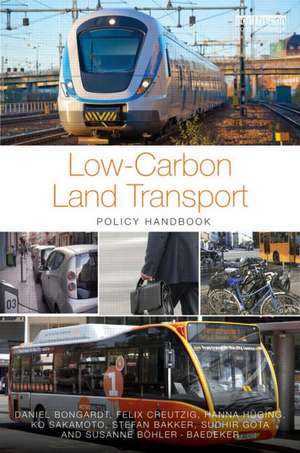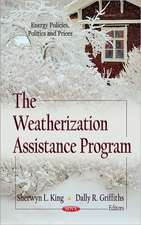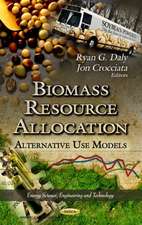Low-Carbon Land Transport: Policy Handbook
Autor Daniel Bongardt, Felix Creutzig, Hanna Hüging, Ko Sakamoto, Stefan Bakker, Sudhir Gota, Susanne Böhler-Baedekeren Limba Engleză Hardback – 14 feb 2013
Based on wide ranging research, it shows how policies can be bundled successfully and worked into urban transport decision-making and planning strategies.
With case studies from developed and developing countries, it outlines measures for reducing emissions, tailoring these to specific circumstances. It also highlights how greenhouse gas savings are measured, as well as success factors for implementing policies and measures in complex decision-making processes.
For students of sustainable transport, professional planners and decision makers, Low-Carbon Land Transport is an invaluable reference for all those looking to help transport networks flow in a sustainable direction.
Preț: 1001.87 lei
Preț vechi: 1221.79 lei
-18% Nou
Puncte Express: 1503
Preț estimativ în valută:
191.70€ • 200.69$ • 158.63£
191.70€ • 200.69$ • 158.63£
Carte tipărită la comandă
Livrare economică 05-19 aprilie
Preluare comenzi: 021 569.72.76
Specificații
ISBN-13: 9781849713771
ISBN-10: 1849713774
Pagini: 264
Ilustrații: 43 b/w images, 34 tables and 19 halftones
Dimensiuni: 156 x 234 x 20 mm
Greutate: 0.5 kg
Ediția:New.
Editura: Taylor & Francis
Colecția Routledge
Locul publicării:Oxford, United Kingdom
ISBN-10: 1849713774
Pagini: 264
Ilustrații: 43 b/w images, 34 tables and 19 halftones
Dimensiuni: 156 x 234 x 20 mm
Greutate: 0.5 kg
Ediția:New.
Editura: Taylor & Francis
Colecția Routledge
Locul publicării:Oxford, United Kingdom
Public țintă
Professional Practice & DevelopmentCuprins
Part 1: The Transport Challenge: Drivers and Trends Part 2: Strategies and Measures: Towards Intelligent Policy Packages Part 3: Measuring Emissions and Reductions Part 4: Managing the Transition to Low Carbon Transport References
Notă biografică
Daniel Bongardt is project director at GIZ – the German International Cooperation – and responsible for urban transport and climate change in China. Since 2009, he has developed GIZ’s transport and climate change agenda. Before that, he worked at the Wuppertal Institute for Climate, Environment and Energy, a think tank on sustainable development.
Felix Creutzig is senior research fellow and group leader in the Economics of Climate Change department at the Technical University of Berlin (Germany). Felix is lead author of the upcoming IPCC Assessment Report on transportation and obtained his PhD in Computational Neuroscience at the Humboldt-Universität of Berlin after graduating in Theoretical Physics from the University of Cambridge.
Hanna Hüging is Research Fellow at the Wuppertal Institute for Climate, Environment and Energy (Germany). Her research focus is on energy-efficient and low-carbon transport strategies. She holds an MSc in Environmental Science from the University of Cologne.
Ko Sakamoto is a transport economist at the Asian Development Bank (ADB). Prior to joining ADB, he worked at the UK Transport Research Laboratory (TRL), focusing on international climate change and sustainable transport policy. He holds an MA in Transport Economics from the University of Leeds.
Stefan Bakker has been a climate policy researcher at the Energy Research Centre of the Netherlands in the area of climate change. He pursues a PhD on the topic of low-carbon development in the transport sector with the University of Twente, the Netherlands. Since October 2012, he implements the ASEAN-German project on Energy Efficiency in the Transport Sector on behalf of GIZ.
Sudhir Gota works as a technical manager in the Clean Air Initiative for Asian Cities (CAI-Asia) Centre in Manila. He specializes in environmental issues related to transport and holds a Masters Degree in Transportation Engineering from the National Institute of Technology, Warangal.
Susanne Böhler-Baedeker is urban planning engineer and co-director of the research group ‘Energy, Transport and Climate Policy’ at the Wuppertal Institute for Climate, Environment and Energy. For her PhD thesis at the University of Dortmund she analyzed the acceptance of different mobility services for individual mobility.
Felix Creutzig is senior research fellow and group leader in the Economics of Climate Change department at the Technical University of Berlin (Germany). Felix is lead author of the upcoming IPCC Assessment Report on transportation and obtained his PhD in Computational Neuroscience at the Humboldt-Universität of Berlin after graduating in Theoretical Physics from the University of Cambridge.
Hanna Hüging is Research Fellow at the Wuppertal Institute for Climate, Environment and Energy (Germany). Her research focus is on energy-efficient and low-carbon transport strategies. She holds an MSc in Environmental Science from the University of Cologne.
Ko Sakamoto is a transport economist at the Asian Development Bank (ADB). Prior to joining ADB, he worked at the UK Transport Research Laboratory (TRL), focusing on international climate change and sustainable transport policy. He holds an MA in Transport Economics from the University of Leeds.
Stefan Bakker has been a climate policy researcher at the Energy Research Centre of the Netherlands in the area of climate change. He pursues a PhD on the topic of low-carbon development in the transport sector with the University of Twente, the Netherlands. Since October 2012, he implements the ASEAN-German project on Energy Efficiency in the Transport Sector on behalf of GIZ.
Sudhir Gota works as a technical manager in the Clean Air Initiative for Asian Cities (CAI-Asia) Centre in Manila. He specializes in environmental issues related to transport and holds a Masters Degree in Transportation Engineering from the National Institute of Technology, Warangal.
Susanne Böhler-Baedeker is urban planning engineer and co-director of the research group ‘Energy, Transport and Climate Policy’ at the Wuppertal Institute for Climate, Environment and Energy. For her PhD thesis at the University of Dortmund she analyzed the acceptance of different mobility services for individual mobility.
Recenzii
"The authors of Low Carbon Land Transport provide policymakers who are committed to sustainable urban development and transport with a comprehensive set of tools and strategies to guide and inform their decisions. This book comes to us at a definitive crossroads in the future of urban transport worldwide, and more than ever, the decisions we make today will determine what kind of city our future generation will inherit." – Holger Dalkmann, Director EMBARQ - The WRI Center for Sustainable Transport
"This is a timely, informative and comprehensive book. It provides a wealth of data and comparisons on transport in countries around the world, reviews trends and covers future scenarios. It draws clear distinctions between countries at different phases of development. Most importantly, it provides ideas and insights for policies needed to change course and put the world on a lower-carbon transport pathway." – Lewis M. Fulton, Co-Director Institute of Transportation Studies - University of California, Davis
"This book explains very well the critical role that transport will have to play in preventing dangerous climate change. It educates policy makers on how they can do this in a manner which can not only reduce climate change but will at the same time give the world more liveable cities at the same time. We should thank the authors that they made the effort to combine their great ideas and experience in this important book" – Cornie Huizenga, Convenor of the Partnership on Sustainable Low Carbon Transport
"This is a timely, informative and comprehensive book. It provides a wealth of data and comparisons on transport in countries around the world, reviews trends and covers future scenarios. It draws clear distinctions between countries at different phases of development. Most importantly, it provides ideas and insights for policies needed to change course and put the world on a lower-carbon transport pathway." – Lewis M. Fulton, Co-Director Institute of Transportation Studies - University of California, Davis
"This book explains very well the critical role that transport will have to play in preventing dangerous climate change. It educates policy makers on how they can do this in a manner which can not only reduce climate change but will at the same time give the world more liveable cities at the same time. We should thank the authors that they made the effort to combine their great ideas and experience in this important book" – Cornie Huizenga, Convenor of the Partnership on Sustainable Low Carbon Transport
Descriere
This book provides a guide for transport policymakers and planners on achieving low-carbon land transport systems and describes possible measures for reducing emissions. Based on wide ranging research, case studies from developed and developing countries and an overview of policy scenarios, it book presents a toolbox for decision-makers with a huge variety of measures which can be tailored to their specific circumstances. It also addresses the question of how policies can be bundled successfully and integrated in urban transport decision-making and planning. Practical information is given on how greenhouse gas savings are measured as well as success factors for implementing policies and measures in complex decision-making processes.















